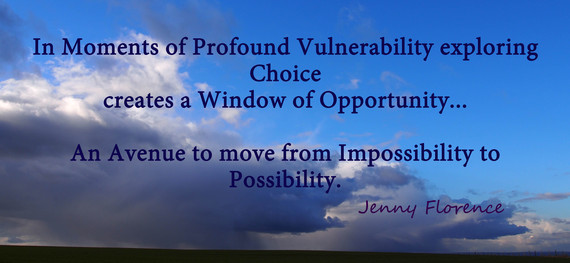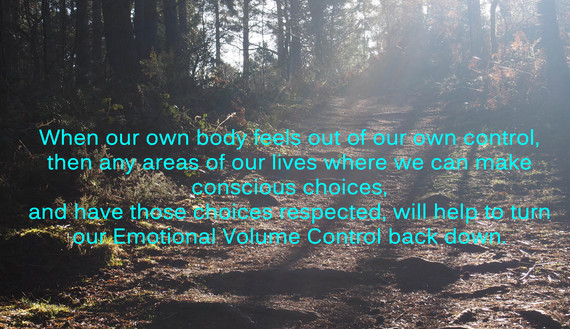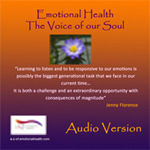How choice helps us to recover from illness and stay healthy.
Recently in my family, an elderly relative became unwell; she was not so unwell that she needed to be admitted into hospital, but was too unwell to be home alone, unattended. Many families face this kind of situation, and aside from any of the wider or longer-term implications, one of the things that I found particularly interesting, and have reflected upon a great deal, is the way that this challenges our own attitudes, beliefs and perceptions about choice.
When someone inquired after my relative, our conversation developed into a fascinating discussion about the way that family expectations and desires can be directly in conflict with the choices of the individual who is needing to recover and to receive care.
As we spoke about the emotional relevance of choice in relation to physical illness, I was reminded of my own therapeutic work with people who are coming to terms with invasive forms of illness. In my experience, those who have greater opportunities for choice, both practically and relationally demonstrate a far greater durability and resilience in coming to terms with their diagnosis. In fact the more that they are able to take charge of their lives, the more their stress levels subside, regardless of the diagnosis that they are having to manage.
I have found that working with choice can make the difference between an experience being manageable or spiraling into a more acute state of trauma. There's a relationship between our ability to make choices and the severity or intensity of our emotional distress, and therefore for the potential build up and development of ongoing trauma.
So let's define trauma? Trauma is the emotional outcome or the emotional consequence that comes from an experience of something happening to us that's out of our control. We are helpless and unable to do anything about it, frightened or even terrified and we lose all sense of safety.
We tend to associate trauma in relation to big and catastrophic events, but actually there are many different levels of trauma and many kinds of traumatic experience and it's important to appreciate the significance of the kind of trauma that comes from more everyday circumstances. Lenore Terr, author of "Too Scared to Cry," defined this distinction using the terms "Single Blow" or "Repeated" Trauma. When we experience a big event, we are more likely to allow ourselves validation of the way that we feel, and this can also give us a valid expectation of receiving some kind of support. However, there is also a kind of trauma that can build up over time.
I am particularly interested in the kind of "Repeated" trauma that comes from a lack of emotional recognition and therefore a lack of responsiveness to the way that we feel about the impact of our circumstances. Significant levels of stress and anxiety can go unacknowledged or even dismissed, which then build up in our systems, causing what I would term a "low grade trauma," giving no end of ongoing problems both physically and mentally, because they haven't really been recognized. And this lack of recognition can come from ourselves as well as from others.
So let's just think about this in relation to illness and to choice.
If your body feels out of your own control, and you are reliant upon others for your care and well-being, then it's appropriate to feel a degree of helplessness. So it's profoundly important to ensure that this experience of helplessness doesn't stack up and turn into a level of low grade trauma, or even high grade trauma. And this is where our capacity to make choices and to feel that our choices are respected and considered is so incredibly important...
To feel emotionally safe we need to feel related to, understood and respected. When we are isolated or alone in a difficult situation and we don't feel supported or connected to then this will generate high levels of stress and anxiety. Likewise, at the other end of the spectrum, if our boundaries are violated and we experience a lack of respect or some form of intrusion, then this will also generate high levels of stress and anxiety. Both create helplessness and feelings of being out of control.
Stress and anxiety in response to a situation that is out of our control, particularly when we are reliant upon others to be responsive to us, will potentially start to generate feelings of helplessness and fear. And remember, trauma is the emotional outcome or consequence when something frightening or terrifying happens to us and we are unable to do anything about it, we are helpless.
Whenever we experience ongoing levels of stress and anxiety with no respite and therefore no underlying return to a place of inner safety or relaxation, then we will gradually, slowly but surely, move into a state of high alert and we will begin to engage with life in a hyper vigilant manner.
Because we don't feel safe this activates the amygdala, the part of our brain that generates our fight, flight or freeze mechanism and this generates various chemicals in our bodies. We generate cortisol, the stress chemical, and we generate adrenaline and we move into a place of high alert. It's as though our sensory experiences have had the volume turned right up. And until we can effectively attend to the situation, and get some kind of somatic release, then the volume control is highly likely to stay in a heightened position.
When our own body feels out of our own control, then any areas of our lives where we can make conscious choices, and have those choices respected, will help to turn that volume control back down. And in any form of long term recovery or longer term care, it will help to keep stress at a healthily appropriate level. Having choices in these kinds of situations actually presents us with an opportunity for what we could term a kind of "emotional damage limitation."
Our mental health and our physical health are completely underpinned by our emotional health.
The impact of high stress levels and anxiety on our physical health including our ability to heal and to recover are well cataloged. High levels of stress and anxiety also inhibit our ability to "think straight." If we are adrenaline-fueled we are far more likely to perceive the actions of others as a threat whether a threat is actually there or not, and far more likely to be reactive than reflective. Our ability to make sound and healthy decisions will be significantly impaired.
Our physical and mental health are supported by our sense of internal emotional resilience and this resilience has a direct relationship to our capacity to feel emotionally safe and therefore an integral relationship to choice. Choice actually plays a vital role in all areas of emotional health and it is profoundly valuable to consider its importance in both the prevention of trauma and the recovery from trauma, particularly as a result of stressful experiences in our everyday lives.
The full audio version of this article is currently available to listen to free of charge on the Homepage of my online Audio Library.
Jenny Florence enjoys conversation with her readers.


